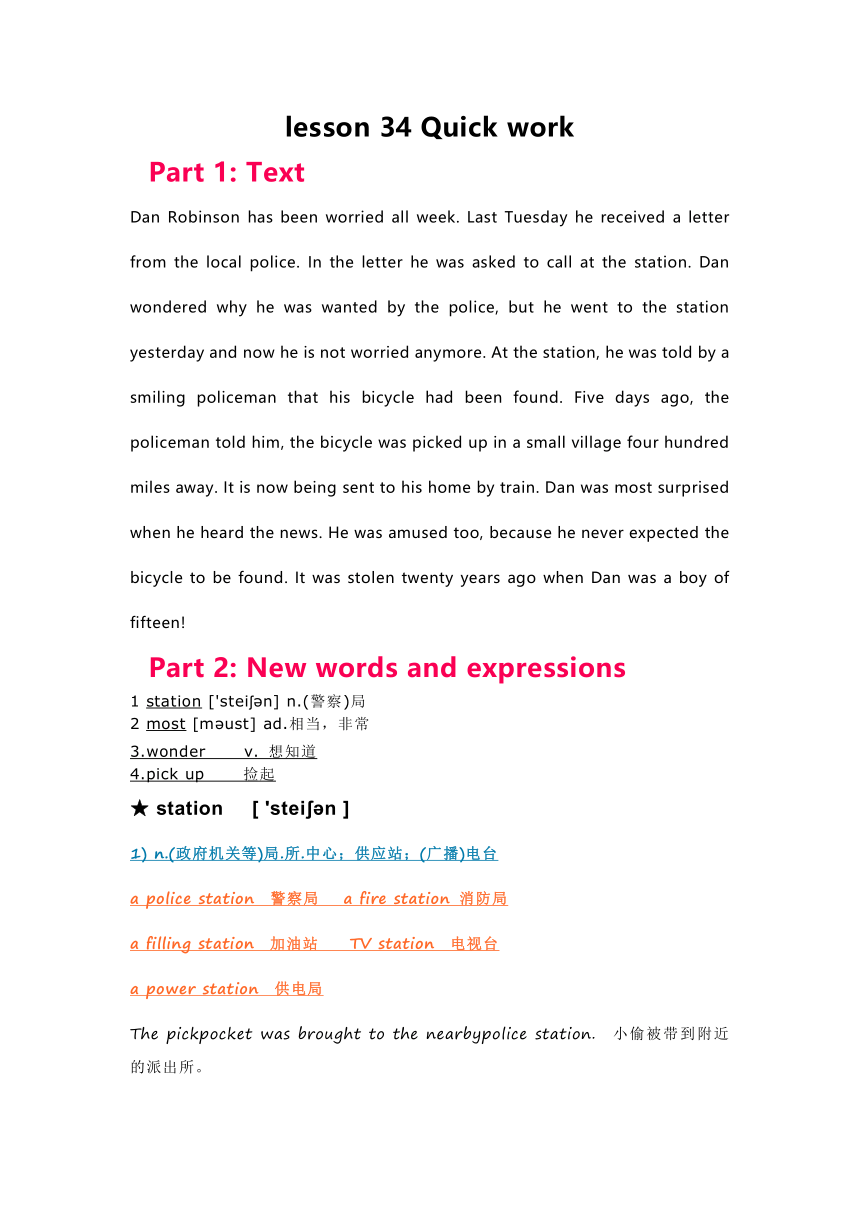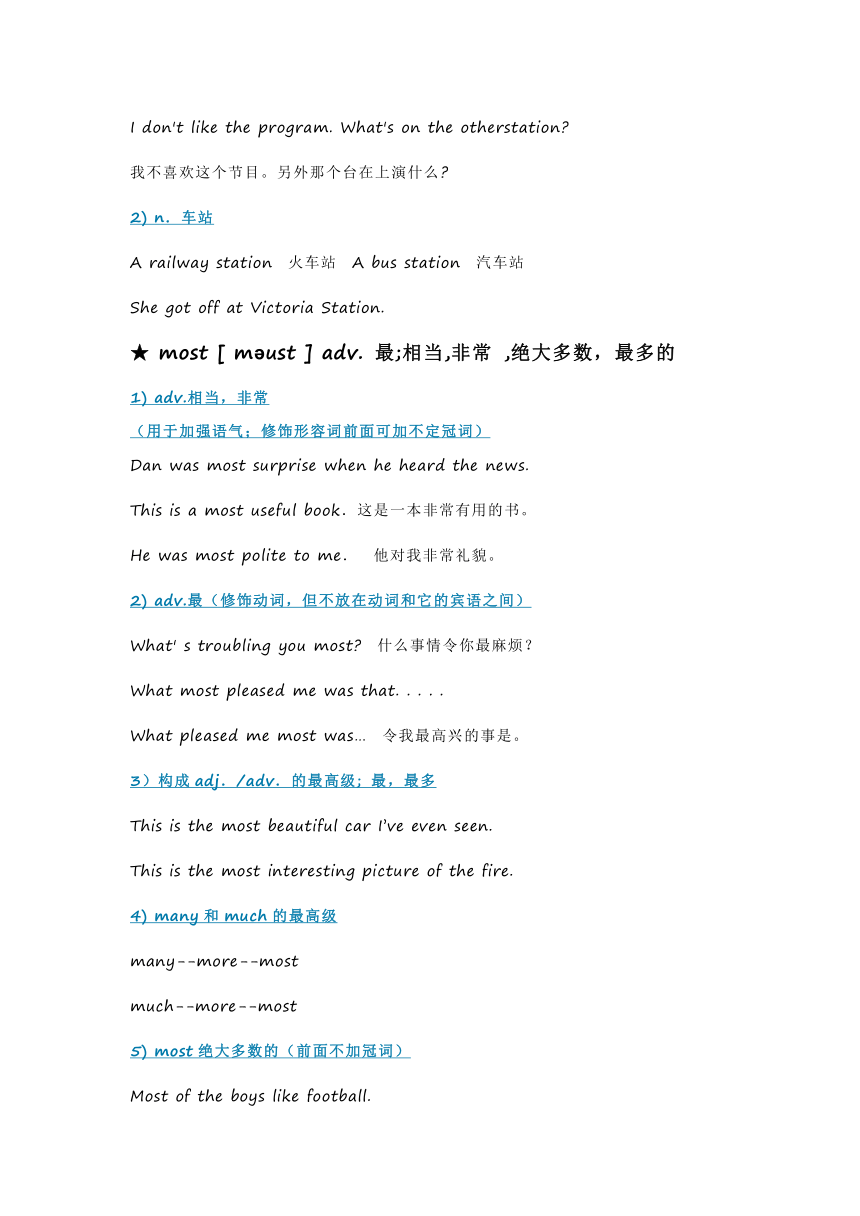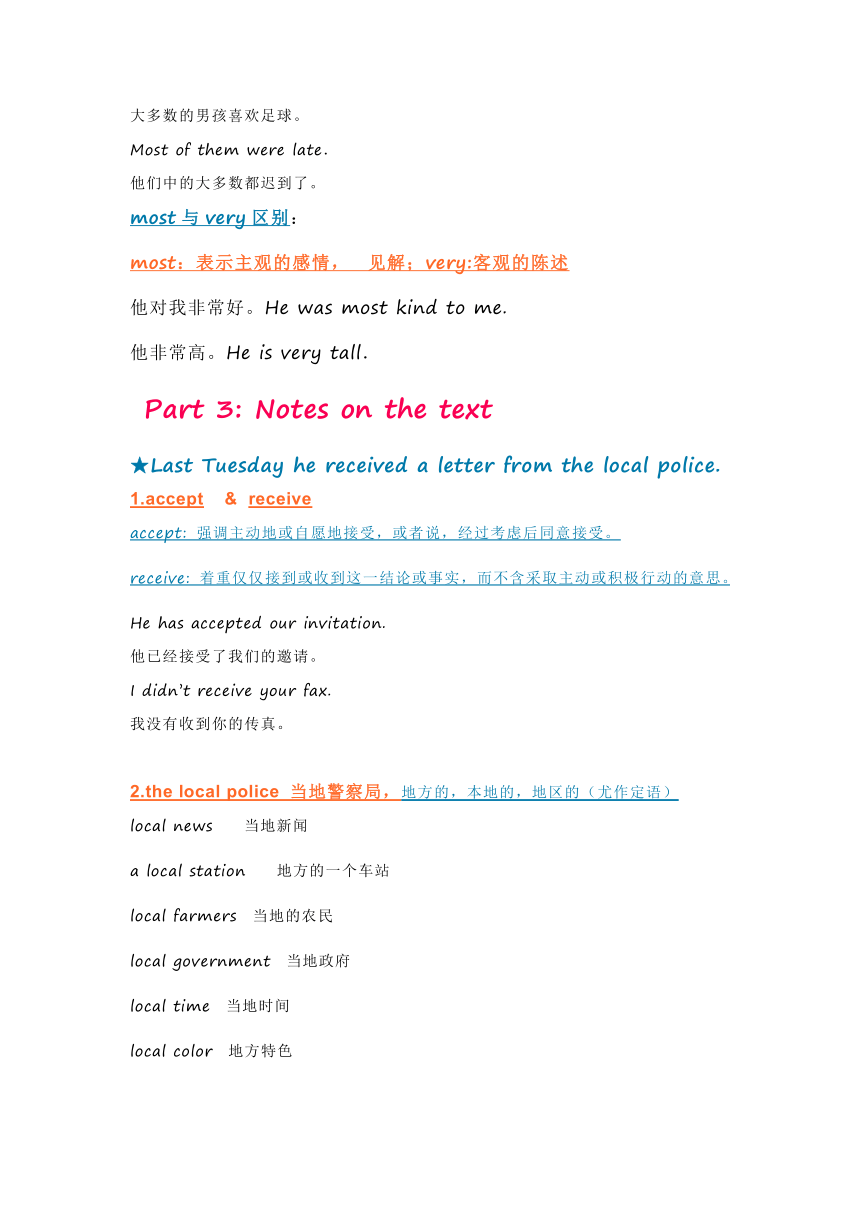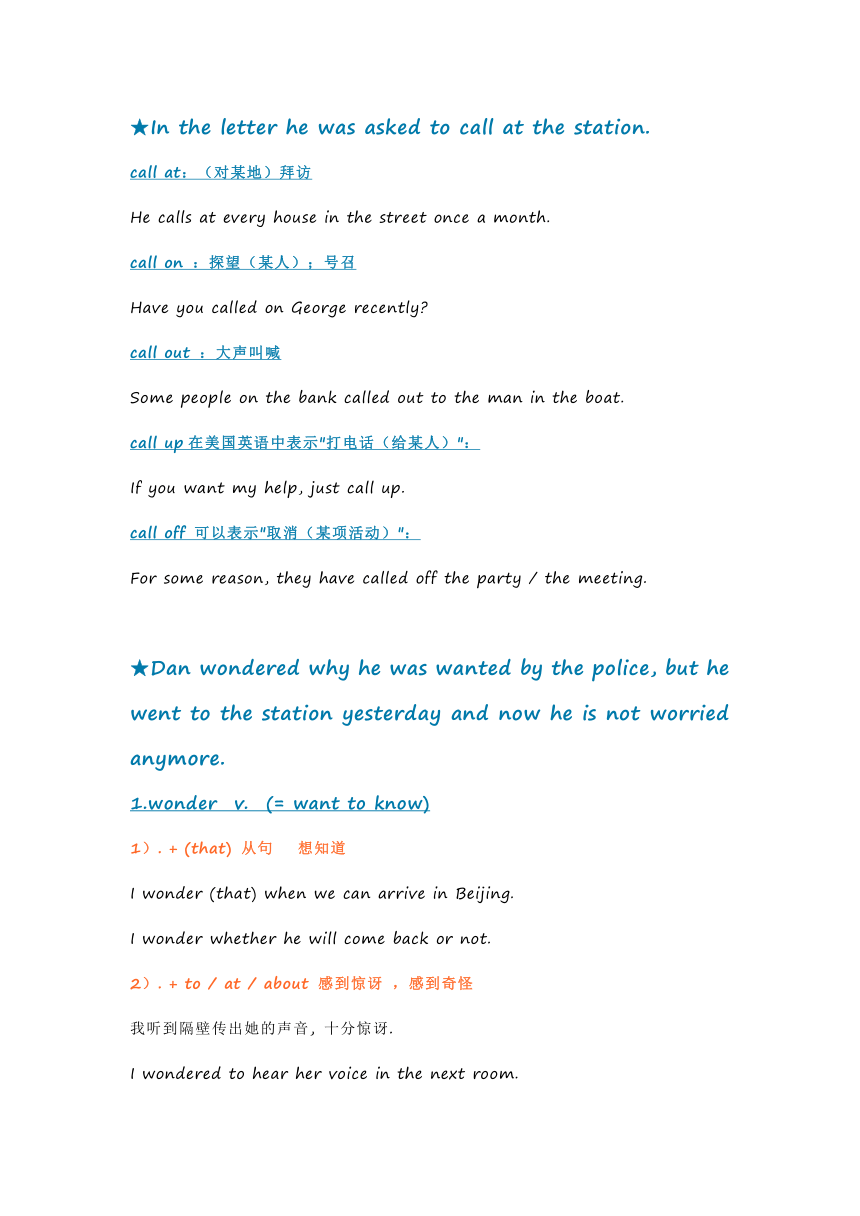新概念英语第二册 Lesson 34 Quick work 讲义
文档属性
| 名称 | 新概念英语第二册 Lesson 34 Quick work 讲义 |  | |
| 格式 | docx | ||
| 文件大小 | 23.7KB | ||
| 资源类型 | 教案 | ||
| 版本资源 | 新概念英语 | ||
| 科目 | 英语 | ||
| 更新时间 | 2023-09-24 22:31:59 | ||
图片预览




文档简介
lesson 34 Quick work
Part 1: Text
Dan Robinson has been worried all week. Last Tuesday he received a letter from the local police. In the letter he was asked to call at the station. Dan wondered why he was wanted by the police, but he went to the station yesterday and now he is not worried anymore. At the station, he was told by a smiling policeman that his bicycle had been found. Five days ago, the policeman told him, the bicycle was picked up in a small village four hundred miles away. It is now being sent to his home by train. Dan was most surprised when he heard the news. He was amused too, because he never expected the bicycle to be found. It was stolen twenty years ago when Dan was a boy of fifteen!
Part 2: New words and expressions
1 station ['stei n] n.(警察)局
2 most [m ust] ad.相当,非常
3.wonder v. 想知道
4.pick up 捡起
★ station [ 'stei n ]
1) n.(政府机关等)局.所.中心;供应站;(广播)电台
a police station 警察局 a fire station 消防局
a filling station 加油站 TV station 电视台
a power station 供电局
The pickpocket was brought to the nearbypolice station. 小偷被带到附近的派出所。
I don't like the program. What's on the otherstation
我不喜欢这个节目。另外那个台在上演什么
2) n.车站
A railway station 火车站 A bus station 汽车站
She got off at Victoria Station.
★ most [ m ust ] adv. 最;相当,非常 ,绝大多数,最多的
1) adv.相当,非常
(用于加强语气;修饰形容词前面可加不定冠词)
Dan was most surprise when he heard the news.
This is a most useful book.这是一本非常有用的书。
He was most polite to me. 他对我非常礼貌。
2) adv.最(修饰动词,但不放在动词和它的宾语之间)
What' s troubling you most 什么事情令你最麻烦?
What most pleased me was that. . . . .
What pleased me most was… 令我最高兴的事是。
3)构成adj./adv.的最高级; 最,最多
This is the most beautiful car I’ve even seen.
This is the most interesting picture of the fire.
4) many和much的最高级
many--more--most
much--more--most
5) most绝大多数的(前面不加冠词)
Most of the boys like football.
大多数的男孩喜欢足球。
Most of them were late.
他们中的大多数都迟到了。
most与very区别:
most:表示主观的感情, 见解;very:客观的陈述
他对我非常好。He was most kind to me.
他非常高。He is very tall.
Part 3: Notes on the text
★Last Tuesday he received a letter from the local police.
1.accept & receive
accept: 强调主动地或自愿地接受,或者说,经过考虑后同意接受。
receive: 着重仅仅接到或收到这一结论或事实,而不含采取主动或积极行动的意思。
He has accepted our invitation.
他已经接受了我们的邀请。
I didn’t receive your fax.
我没有收到你的传真。
2.the local police 当地警察局,地方的,本地的,地区的(尤作定语)
local news 当地新闻
a local station 地方的一个车站
local farmers 当地的农民
local government 当地政府
local time 当地时间
local color 地方特色
★In the letter he was asked to call at the station.
call at:(对某地)拜访
He calls at every house in the street once a month.
call on :探望(某人);号召
Have you called on George recently
call out :大声叫喊
Some people on the bank called out to the man in the boat.
call up在美国英语中表示"打电话(给某人)":
If you want my help, just call up.
call off 可以表示"取消(某项活动)":
For some reason, they have called off the party / the meeting.
★Dan wondered why he was wanted by the police, but he went to the station yesterday and now he is not worried anymore.
1.wonder v. (= want to know)
1). + (that) 从句 想知道
I wonder (that) when we can arrive in Beijing.
I wonder whether he will come back or not.
2). + to / at / about 感到惊讶 ,感到奇怪
我听到隔壁传出她的声音, 十分惊讶.
I wondered to hear her voice in the next room.
I wondered at their fast speed.我惊叹他们的速度之快.
I was wondering about that thing.我总觉得那件事很莫名其妙.
名词,世界七大奇迹 The seven wonders of the world
2.wanted
Hey, Jack! You’re wanted on the phone.
This is the man who is wanted by the police.
want 用于被动语态时可以表示想与某人见面,谈话,或表示通缉,追捕。
3.not…any more:
我不能再见你了。I can’t see you any more.
我不能再等了。I can’t wait any more.
他不再是个年轻人了。
He is not a young man any more.
not…any more=no more
not …any longer=no longer
★At the station, he was told by a smiling policeman that his bicycle had been found.
一只睡着的狗 a sleeping dog
一张焦虑的脸 a worried face
★Five days ago, the policeman told him, the bicycle was picked up in a small village four hundred miles away.
1) pick up…… 拿起,拾起:接收器
I picked up the receiver as soon as the phone rang.
2)用车接人:
I’ll pick you up at your office. 我来办公室接你。
3) (不经意) 学到:
She picked up French in Paris.她是在巴黎学会法语的。
4)(无意地,顺便地)获得,找到:
Where did you pick up that book 你在哪儿买到那本书的?
I've picked up a bad cold.我得了重感冒。
5). 使好转,改进,增进……
Sue was able to pick up her health under the help of the doctor.
The train is slowly picking up speed.
★It is now being sent to his home by train.
现在进行时被动语态
长江上正在修建另一座大桥。
Another bridge is being built over the Changjiang River.
我校正在举行运动会。
The sports meeting is being held in our school.
现在学生们正在打扫教室。
The classroom is being cleaned now.
★Dan was most surprised when he heard the news.
most前面不加冠词,表示“非常”、“极其”
你心肠真好。 That’s most kind of you .
他对我真是彬彬有礼。 He was most polite to me.
★He was amused too, because he never expected the bicycle to be found. Everyone was amused at/by the story about the dog.
1.有趣的故事 Amusing stories
2.expect +that
He never expected that the bicycle would be found.
He never expected that the police would find the bicycle.
3.except sb. to do sth.
We all expected her to win the prize.
4.sb. be expected to do sth.
She was expected to win the prize.
5.expect sth. to be done
We all expected the prize to be won by her.
Part 4: Grammar&Difficult points
被动语态
在主动句中,主语是动作的实施者。被动句中,主语则是动作的承受者。
构成形式:be+过去分词
不同时态的被动语态
1.一般过去时 was/were +过去分词
In the letter he was asked to call at the station.
2.现在完成时 has/have been +过去分词
I have been told to go to your birthday party.
3.过去完成时 had been +过去分词
The bicycle had been found five days ago.
Exercise:将下列句子变为被动语态。
1.They are sending him abroad.
He is being sent abroad.
2. The police were questioning the man.
The man was being questioned by the police.
3.He told me to wait for you.
I was told to wait for him.
4.They have found your wallet.
Your wallet has been found.
5. He never expected them to find the bicycle.
He never expected the bicycle to be found.
Part 5: Homework
1.背诵lesson 34单词&课文
2.Retell the text
3.练习总结课文
Part 1: Text
Dan Robinson has been worried all week. Last Tuesday he received a letter from the local police. In the letter he was asked to call at the station. Dan wondered why he was wanted by the police, but he went to the station yesterday and now he is not worried anymore. At the station, he was told by a smiling policeman that his bicycle had been found. Five days ago, the policeman told him, the bicycle was picked up in a small village four hundred miles away. It is now being sent to his home by train. Dan was most surprised when he heard the news. He was amused too, because he never expected the bicycle to be found. It was stolen twenty years ago when Dan was a boy of fifteen!
Part 2: New words and expressions
1 station ['stei n] n.(警察)局
2 most [m ust] ad.相当,非常
3.wonder v. 想知道
4.pick up 捡起
★ station [ 'stei n ]
1) n.(政府机关等)局.所.中心;供应站;(广播)电台
a police station 警察局 a fire station 消防局
a filling station 加油站 TV station 电视台
a power station 供电局
The pickpocket was brought to the nearbypolice station. 小偷被带到附近的派出所。
I don't like the program. What's on the otherstation
我不喜欢这个节目。另外那个台在上演什么
2) n.车站
A railway station 火车站 A bus station 汽车站
She got off at Victoria Station.
★ most [ m ust ] adv. 最;相当,非常 ,绝大多数,最多的
1) adv.相当,非常
(用于加强语气;修饰形容词前面可加不定冠词)
Dan was most surprise when he heard the news.
This is a most useful book.这是一本非常有用的书。
He was most polite to me. 他对我非常礼貌。
2) adv.最(修饰动词,但不放在动词和它的宾语之间)
What' s troubling you most 什么事情令你最麻烦?
What most pleased me was that. . . . .
What pleased me most was… 令我最高兴的事是。
3)构成adj./adv.的最高级; 最,最多
This is the most beautiful car I’ve even seen.
This is the most interesting picture of the fire.
4) many和much的最高级
many--more--most
much--more--most
5) most绝大多数的(前面不加冠词)
Most of the boys like football.
大多数的男孩喜欢足球。
Most of them were late.
他们中的大多数都迟到了。
most与very区别:
most:表示主观的感情, 见解;very:客观的陈述
他对我非常好。He was most kind to me.
他非常高。He is very tall.
Part 3: Notes on the text
★Last Tuesday he received a letter from the local police.
1.accept & receive
accept: 强调主动地或自愿地接受,或者说,经过考虑后同意接受。
receive: 着重仅仅接到或收到这一结论或事实,而不含采取主动或积极行动的意思。
He has accepted our invitation.
他已经接受了我们的邀请。
I didn’t receive your fax.
我没有收到你的传真。
2.the local police 当地警察局,地方的,本地的,地区的(尤作定语)
local news 当地新闻
a local station 地方的一个车站
local farmers 当地的农民
local government 当地政府
local time 当地时间
local color 地方特色
★In the letter he was asked to call at the station.
call at:(对某地)拜访
He calls at every house in the street once a month.
call on :探望(某人);号召
Have you called on George recently
call out :大声叫喊
Some people on the bank called out to the man in the boat.
call up在美国英语中表示"打电话(给某人)":
If you want my help, just call up.
call off 可以表示"取消(某项活动)":
For some reason, they have called off the party / the meeting.
★Dan wondered why he was wanted by the police, but he went to the station yesterday and now he is not worried anymore.
1.wonder v. (= want to know)
1). + (that) 从句 想知道
I wonder (that) when we can arrive in Beijing.
I wonder whether he will come back or not.
2). + to / at / about 感到惊讶 ,感到奇怪
我听到隔壁传出她的声音, 十分惊讶.
I wondered to hear her voice in the next room.
I wondered at their fast speed.我惊叹他们的速度之快.
I was wondering about that thing.我总觉得那件事很莫名其妙.
名词,世界七大奇迹 The seven wonders of the world
2.wanted
Hey, Jack! You’re wanted on the phone.
This is the man who is wanted by the police.
want 用于被动语态时可以表示想与某人见面,谈话,或表示通缉,追捕。
3.not…any more:
我不能再见你了。I can’t see you any more.
我不能再等了。I can’t wait any more.
他不再是个年轻人了。
He is not a young man any more.
not…any more=no more
not …any longer=no longer
★At the station, he was told by a smiling policeman that his bicycle had been found.
一只睡着的狗 a sleeping dog
一张焦虑的脸 a worried face
★Five days ago, the policeman told him, the bicycle was picked up in a small village four hundred miles away.
1) pick up…… 拿起,拾起:接收器
I picked up the receiver as soon as the phone rang.
2)用车接人:
I’ll pick you up at your office. 我来办公室接你。
3) (不经意) 学到:
She picked up French in Paris.她是在巴黎学会法语的。
4)(无意地,顺便地)获得,找到:
Where did you pick up that book 你在哪儿买到那本书的?
I've picked up a bad cold.我得了重感冒。
5). 使好转,改进,增进……
Sue was able to pick up her health under the help of the doctor.
The train is slowly picking up speed.
★It is now being sent to his home by train.
现在进行时被动语态
长江上正在修建另一座大桥。
Another bridge is being built over the Changjiang River.
我校正在举行运动会。
The sports meeting is being held in our school.
现在学生们正在打扫教室。
The classroom is being cleaned now.
★Dan was most surprised when he heard the news.
most前面不加冠词,表示“非常”、“极其”
你心肠真好。 That’s most kind of you .
他对我真是彬彬有礼。 He was most polite to me.
★He was amused too, because he never expected the bicycle to be found. Everyone was amused at/by the story about the dog.
1.有趣的故事 Amusing stories
2.expect +that
He never expected that the bicycle would be found.
He never expected that the police would find the bicycle.
3.except sb. to do sth.
We all expected her to win the prize.
4.sb. be expected to do sth.
She was expected to win the prize.
5.expect sth. to be done
We all expected the prize to be won by her.
Part 4: Grammar&Difficult points
被动语态
在主动句中,主语是动作的实施者。被动句中,主语则是动作的承受者。
构成形式:be+过去分词
不同时态的被动语态
1.一般过去时 was/were +过去分词
In the letter he was asked to call at the station.
2.现在完成时 has/have been +过去分词
I have been told to go to your birthday party.
3.过去完成时 had been +过去分词
The bicycle had been found five days ago.
Exercise:将下列句子变为被动语态。
1.They are sending him abroad.
He is being sent abroad.
2. The police were questioning the man.
The man was being questioned by the police.
3.He told me to wait for you.
I was told to wait for him.
4.They have found your wallet.
Your wallet has been found.
5. He never expected them to find the bicycle.
He never expected the bicycle to be found.
Part 5: Homework
1.背诵lesson 34单词&课文
2.Retell the text
3.练习总结课文
同课章节目录
